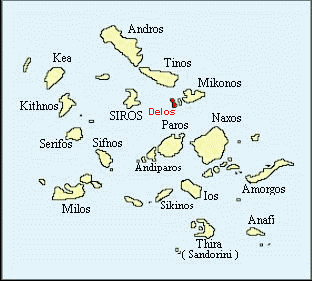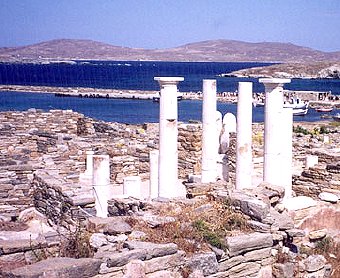
 Delos, a Hardworking Deity's Home Away from Home
Delos, a Hardworking Deity's Home Away from Home
by Toni
 Delos,
the center of the Cyclades Islands was the birthplace of Apollo, is located off
of the southeastern coast of Greece. The name Cyclades comes from the word kyklos
the Greek word for "circle". The other Cylcades Islands form a ring
around her (Heinrich). Delos, was said to have been called by other names, one
of which was Asteria, a maiden who was pursued by Zeus how also happened to be
the sister of Leto, Apollo's mother. Before consenting to be the birthplace of
Apollo Asteria was said to be the ringleader of a clique of islands that roamed
the Mediterranean Ocean. She consents to be the harbored of Leto and gives safe
passage of Apollo into the world. At the time of Apollo's birth Asteria roots
herself to the bottom of the Aegean (Nishimura-Jenson 288-291). Hence the name
Delos was given to the island in honor of the Apollo seeing the suns bright rays
there for the first time (Harris and Platzner 206).
Delos,
the center of the Cyclades Islands was the birthplace of Apollo, is located off
of the southeastern coast of Greece. The name Cyclades comes from the word kyklos
the Greek word for "circle". The other Cylcades Islands form a ring
around her (Heinrich). Delos, was said to have been called by other names, one
of which was Asteria, a maiden who was pursued by Zeus how also happened to be
the sister of Leto, Apollo's mother. Before consenting to be the birthplace of
Apollo Asteria was said to be the ringleader of a clique of islands that roamed
the Mediterranean Ocean. She consents to be the harbored of Leto and gives safe
passage of Apollo into the world. At the time of Apollo's birth Asteria roots
herself to the bottom of the Aegean (Nishimura-Jenson 288-291). Hence the name
Delos was given to the island in honor of the Apollo seeing the suns bright rays
there for the first time (Harris and Platzner 206).
Although Delos was a rocky
island she gladly consents to be the birthplace of Apollo. She only ask Leto to
swear an oath to her that Apollo's first temple will be upon her shores as an
oracle for men, before he builds other temples in other areas for she is sure
that Apollo will be renown by man (Hesiod 62-82).
Delos prospers as the home
of Apollo (133-139). The Ionians gather on Delos to honor Apollo with boxing,
dancing and song. Delos grows in wealth as the center of commerce and religion,
commerce and politics in the Agean.
There were many temples and sanctuaries
to honor other divinities and foreign gods adjacent to Sacred Lake. The Delian
Festivals and Games were held every four years to honor the Gods the cult of Apollo
lived on the island during the Dark Ages. Delos was a member of the Ionian League
and a religious festival was held to honor the birth of Apollo every year. Athens
a member of the Ionian League gained control of the sanctuary in 543 B.C. and
ordered the first purification of the island. All tombs in view of the temple
were removed. On the second purification of the island all the dead were exhumed
and removed from the island and a decree against the birth, death and pain on
the island was passed Delos was also the home of the Delian League from 478-454
B.C. Athens, the principle citi-state controlled the Delian League, but the treasury
was kept on Delos, in the temple of Apollo until it was moved to Athens where
the funds were misappropriated for the rebuilding if the Acropolis (Perseus 1).
So after all is said and done Leto shines as the proud mother of Apollo. Leto
alone awaits Apollo with open arms to his father's side. When Apollo arrives at
his fathers house with his silver bow with an arrow notched for flight if is his
mother who takes his bow and unstring it and places it on a golden peg against
a pillar. All the other gods tremble before him and spring from their seats at
his approach. Letos seats him before Zeus who gives him nectar in a golden cup
and welcomes him amongst the gods. Leto rejoices because she bore Zeus two great
children Apollo of Delos, a mighty son and archer and Artemis, of Ortygia, his
twin, who also delights in the use of bow and quiver. Hesiod (1-18).
As
the center of politic in the Agean, Delos was also neutral during times of ware
and peace. As a "holy place", Delos was immune from being attacked or
sacked under the laws of Thucydides. Those same laws allowed for her to owned
and ruled by foreign powers. Any person's who broke those rules were subject to
the wrath of the God's and the condemnation of the public (Taran 142-143). However
religious aspect on Delos gave way to commerce in 146 B. C. The Apollo festival
became an international trade fair where as many as 10,000 slaves changed hands
in a single day. The Romans kept Delos a free port of trade when they took control
of the island in 166 B. C. With the changes in the Roman trade routes and the
attacks by pirates in 69 B.C. the Delos began to decline, and by the 2nd century
A. D. it was abandoned (Perseus 2).
 What
is left today of Delos is one of the most extensive ruins in the world. The island
is no longer habituated. Delos is a "tiny island with ruins of ancient religious
centre- one of Greece's most important archeological sites" (Crowe). What
remains are temples and homes all over the island from many cultures. In order
to reach Delos one must travel by boat from Mykonos. However tours are no longer
than four hours in length. There are many cultures represented on the island of
Delos today. Shrines to Samothraian, Egyptian and Syrian Gods are interspersed
with the Greek ones.
What
is left today of Delos is one of the most extensive ruins in the world. The island
is no longer habituated. Delos is a "tiny island with ruins of ancient religious
centre- one of Greece's most important archeological sites" (Crowe). What
remains are temples and homes all over the island from many cultures. In order
to reach Delos one must travel by boat from Mykonos. However tours are no longer
than four hours in length. There are many cultures represented on the island of
Delos today. Shrines to Samothraian, Egyptian and Syrian Gods are interspersed
with the Greek ones.
There are entire sections of residential areas still intact
today on Delos. City streets are clearly outlined with sewers running underneath
them. Most of the homes in the northern section of the towns are said to be modest
homes. Many of the homes although vacant for over two thousand years still have
sections that are still intact after the looting of pirates and being exposed
to the elements for such a long period of time. Some homes even had private baths
with running water. The central sections of the old Greek towns housed the functional
temples of the Greek citizenry. There were also city squares there, which were
the marketplaces. (mrfts 2-3).
On the hill the southern end of the town mosaics
to Dionysus and Apollo can be found. The dolphin is the symbol of Apollo and the
panther is the symbol of Dionysus(4). Delos also had a central citrine there was
no fresh water source, so all water had to be captured from rainfall. Mt Kynthos,
a sacred mountain is also on Delos(6).
Works
cited Crowe, Felicity, ed. Course Guide to Europe and the
Mediteranian. London: Dorling Kinderlsby Limited: 2001
Feder, Lilian. Crowell's
Handbook of Classical Literature. New York: Thomas Y. Crowell Company, 1964
Harris,
Stephen, and Gloria Pitzner. Classical Mythology: Images and Insights. Moutain,
CA: Mayfield Publishing Company, 2001
Heinrichs, Ann. Greece: Enchantment
of the World. New York: Childrens Press 2002
Tran, W.W. "The Political
Standing of Delos." The Journal of Hellinic Studies, Vol.44, Part 2 (1924):
141-157
Delos, Greece-April 2002<http://www.mrfts.net/trips/2002/Greece/Delos?Delos.html>.
Perseus
Site: Delos, Site Catalog Name: Delos.13 February 2002 <www.perseus.tufts.edu/cgi-bin/siteindex/lookup=Delos>.
 Delos,
the center of the Cyclades Islands was the birthplace of Apollo, is located off
of the southeastern coast of Greece. The name Cyclades comes from the word kyklos
the Greek word for "circle". The other Cylcades Islands form a ring
around her (Heinrich). Delos, was said to have been called by other names, one
of which was Asteria, a maiden who was pursued by Zeus how also happened to be
the sister of Leto, Apollo's mother. Before consenting to be the birthplace of
Apollo Asteria was said to be the ringleader of a clique of islands that roamed
the Mediterranean Ocean. She consents to be the harbored of Leto and gives safe
passage of Apollo into the world. At the time of Apollo's birth Asteria roots
herself to the bottom of the Aegean (Nishimura-Jenson 288-291). Hence the name
Delos was given to the island in honor of the Apollo seeing the suns bright rays
there for the first time (Harris and Platzner 206).
Delos,
the center of the Cyclades Islands was the birthplace of Apollo, is located off
of the southeastern coast of Greece. The name Cyclades comes from the word kyklos
the Greek word for "circle". The other Cylcades Islands form a ring
around her (Heinrich). Delos, was said to have been called by other names, one
of which was Asteria, a maiden who was pursued by Zeus how also happened to be
the sister of Leto, Apollo's mother. Before consenting to be the birthplace of
Apollo Asteria was said to be the ringleader of a clique of islands that roamed
the Mediterranean Ocean. She consents to be the harbored of Leto and gives safe
passage of Apollo into the world. At the time of Apollo's birth Asteria roots
herself to the bottom of the Aegean (Nishimura-Jenson 288-291). Hence the name
Delos was given to the island in honor of the Apollo seeing the suns bright rays
there for the first time (Harris and Platzner 206).

 What
is left today of Delos is one of the most extensive ruins in the world. The island
is no longer habituated. Delos is a "tiny island with ruins of ancient religious
centre- one of Greece's most important archeological sites" (Crowe). What
remains are temples and homes all over the island from many cultures. In order
to reach Delos one must travel by boat from Mykonos. However tours are no longer
than four hours in length. There are many cultures represented on the island of
Delos today. Shrines to Samothraian, Egyptian and Syrian Gods are interspersed
with the Greek ones.
What
is left today of Delos is one of the most extensive ruins in the world. The island
is no longer habituated. Delos is a "tiny island with ruins of ancient religious
centre- one of Greece's most important archeological sites" (Crowe). What
remains are temples and homes all over the island from many cultures. In order
to reach Delos one must travel by boat from Mykonos. However tours are no longer
than four hours in length. There are many cultures represented on the island of
Delos today. Shrines to Samothraian, Egyptian and Syrian Gods are interspersed
with the Greek ones.